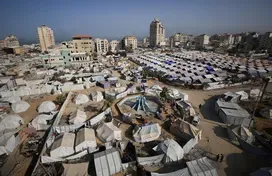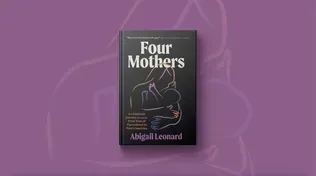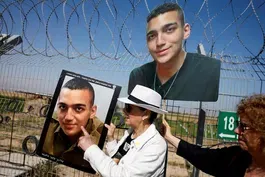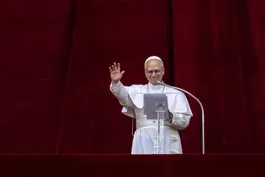
One woman’s mission to help save cheetahs from extinction
Clip: 5/11/2025 | 5m 30sVideo has Closed Captions
One woman’s mission to help save cheetahs from extinction
Cheetahs, the fastest mammals on Earth, are now in a race against extinction. It’s estimated that fewer than 7,000 exist in the wild. John Yang speaks with Laurie Marker, a woman who has already helped dramatically reduce one threat to cheetahs and is tackling new ones that have emerged, for our Weekend Spotlight.
Problems with Closed Captions? Closed Captioning Feedback
Problems with Closed Captions? Closed Captioning Feedback
Major corporate funding for the PBS News Hour is provided by BDO, BNSF, Consumer Cellular, American Cruise Lines, and Raymond James. Funding for the PBS NewsHour Weekend is provided by...

One woman’s mission to help save cheetahs from extinction
Clip: 5/11/2025 | 5m 30sVideo has Closed Captions
Cheetahs, the fastest mammals on Earth, are now in a race against extinction. It’s estimated that fewer than 7,000 exist in the wild. John Yang speaks with Laurie Marker, a woman who has already helped dramatically reduce one threat to cheetahs and is tackling new ones that have emerged, for our Weekend Spotlight.
Problems with Closed Captions? Closed Captioning Feedback
How to Watch PBS News Hour
PBS News Hour is available to stream on pbs.org and the free PBS App, available on iPhone, Apple TV, Android TV, Android smartphones, Amazon Fire TV, Amazon Fire Tablet, Roku, Samsung Smart TV, and Vizio.
Providing Support for PBS.org
Learn Moreabout PBS online sponsorshipCheetahs are the fastest mammals on Earth, capable of accelerating from a standing start to 60 miles per hour in seconds.
But now they are in a race against extinction.
It's estimated that fewer than 7,000 exist in the wild.
Earlier, John Yang sat down with Laurie Marker, a woman who's already helped dramatically reduce one threat to cheetahs and is tackling new ones that have emerged.
She's the executive director of the Cheetah Conservation Fund, which is based in Namibia and the subject of our Weekend Spotlight.
JOHN YANG: Laurie, how has the threat to cheetahs evolved in the time you've been working with them?
LAURIE MARKER, Executive Director, Cheetah Conservation Fund: Mostly it's human wildlife conflict, loss of habitat, the illegal wildlife pet trade.
And as human numbers grow in Africa, and we're not addressing much around the poverty issues, we end up having more and more of these problems, not only for cheetahs, but all the other predators.
JOHN YANG: And when you first got to Namibia, it was farmers?
LAURIE MARKER: You'd call them ranchers here, but they are livestock farmers, and they were killing hundreds of cheetahs every year.
JOHN YANG: And how did you go about addressing that?
LAURIE MARKER: Going door to door, talking with the farmers, addressing their questions.
They wanted to know how cheetahs lived.
I wanted to know how cheetahs lived on their land.
I wanted to know about their farming systems, their livestock, did they protect them?
I learned from them what they needed to know in order to live with cheetahs.
And they taught me a lot about what they didn't know so I could make a plan.
JOHN YANG: And how much of a difference did that make?
LAURIE MARKER: Oh, I think it's made a huge difference.
They accepted me, I mean, obviously, as an American woman coming in, telling them anything, you don't tell anybody something.
You actually ask them questions and then try to figure out solutions.
And that became livestock guarding dogs, or our education programs, or we call it Future Farmers of Africa training programs, our science, you know, how far does a cheetah live?
They're one of the largest ranging animals on Earth, up to 800 square miles.
Nobody knew that.
We learned a lot about their biology, their genetics, and all of that was all through the cooperation with the farmers.
JOHN YANG: What are you doing to address the current problems?
LAURIE MARKER: A lot of what we're doing is continuing with our research.
So big issues around the illegal wildlife pet trade, which is started, you know, within a decade when we started realizing from the Horn of Africa, cheetah cubs are being poached from the wild and sold into the illegal wildlife pet trade.
And so with that, we've taken a lot of the programs that we've developed in Namibia and brought them into The Horn of Africa.
Community based programs where we're developing conservancies which are hopefully going to affect livelihoods and get the communities to live in harmony with the wildlife that's on the land.
And then if we could help them learn how to better live with a predator by protecting their livestock, having more wildlife, have good grazing, then they can all live in harmony together and the cheetah can live.
JOHN YANG: What do you do?
Do you have to rehabilitate the cheetahs you take out of the illegal pet trade?
LAURIE MARKER: Most of them have come in such bad condition for the last really seven years we've been on the ground and have brought them into a captive environment and have to get them healthy.
They're right now not necessarily ready for rehabilitation, but are developing programs around what that can look like.
And much of the work that we've done in Namibia has allowed us to make those plans.
You don't take a hand raised baby cub and put it back out in the wild, but if we get them at an older age, we can actually raise them up until they're about 18 to 20 months of age, which is when they would leave their mother and then be able to collar them and put them out.
It takes them a couple of months to learn how to hunt.
You have to supplement them and be there.
But they're not habituated tame animals.
We put cheetahs back India a few years ago and they're now breeding successfully.
So we're learning that we can put animals back where the cheetah was extinct.
And India they were extinct for over 70 years.
JOHN YANG: I've seen you quoted as saying, save the cheetah, change the world.
What do you mean by that?
LAURIE MARKER: Well, I think in order to save the cheetah, the world does have to change.
The people that we're working with are in some of the most arid landscapes.
They're very, very poor.
They all have livestock, they have no training and with that they have livestock losses.
And so I think in changing the world, we look at these community programs, the development of conservancies, integrating the communities into this, helping them with their livelihoods and ecotourism plays an important part of that.
And if you have wildlife on your land, people are going to come to Africa to see our wildlife and then the communities benefit from that.
And that's why these community based programs like conservancies play such an important role.
And Namibia has been a leader in this and we're now helping put that into many of the different countries where the cheetah lives.
But there are only about 7,000 cheetahs left in the world.
They're only found in about 20 countries in around 30 populations.
And 20 of those populations are under 100 individuals.
So the cheetah is also an interesting animal because it lacks genetic diversity.
And much of our research has actually identified that.
And with that, it's more susceptible to aspects around climate change, but also that of the environmental and ecological changes that are going on around them.
JOHN YANG: Laurie Marker, thank you very much.
LAURIE MARKER: Thank you.
‘Catastrophic’ conditions in Gaza under Israeli blockade
Video has Closed Captions
Clip: 5/11/2025 | 4m 23s | ‘Catastrophic’ conditions in Gaza as Israeli blockade enters third month, aid group says (4m 23s)
‘Four Mothers’ shares worldwide experiences of parenthood
Video has Closed Captions
Clip: 5/11/2025 | 5m 32s | New book ‘Four Mothers’ explores the first year of parenthood around the world (5m 32s)
News Wrap: Hamas says it will release hostage Edan Alexander
Video has Closed Captions
Clip: 5/11/2025 | 2m 45s | News Wrap: Hamas says it will release hostage Edan Alexander (2m 45s)
Pope Leo XIV calls for peace and unity in Sunday address
Video has Closed Captions
Clip: 5/11/2025 | 5m 26s | Pope Leo XIV calls for peace in Gaza and Ukraine in his first Sunday address as pontiff (5m 26s)
Providing Support for PBS.org
Learn Moreabout PBS online sponsorshipSupport for PBS provided by:
Major corporate funding for the PBS News Hour is provided by BDO, BNSF, Consumer Cellular, American Cruise Lines, and Raymond James. Funding for the PBS NewsHour Weekend is provided by...















